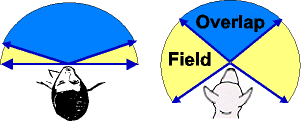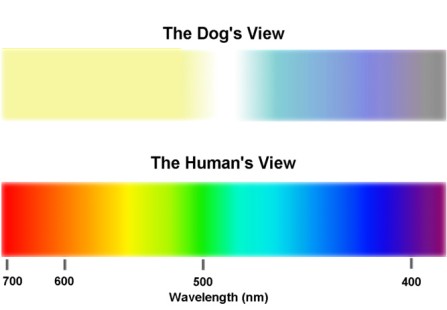 |
Canine Vision
by Mark Plonsky, Ph.D.
Text and images copyright © 1998
This article is also available in Dutch, German, & Turkish
|
Summary
Dogs are red-green color blind. They see a brighter and less detailed world when compared to humans. Peripheral vision is better than humans (dogs see more of the world), but distance is not judged quite as well. Dogs excel at night vision and the detection of moving objects. Figure 1 is a rough guesstimate of what a dog and human might see when viewing a color band (the electromagnetic spectrum).
These differences in visual ability make sense in light of evolutionary theory. Good depth perception and visual acuity are necessary for a primate (from which humans evolved) jumping from tree limb to tree limb. Good color vision enabled this primate to choose the ripest and most nutritious fruit. The canine, on the other hand, is well adapted as a nocturnal hunter of camouflaged prey.
Particulars
- Color
Dogs see something like a human deuteranope, that is, they are red-green color blind (occurs in 4% of male humans). Simply put, this is due to having only 2 cone types rather than 3 (light sensitive cells include cones and rods).
- Detail or Acuity
Since dogs have no fovea (or area with 100% cones), their estimated eye for detail is (roughly) 6 times poorer than in an average human.
- Night Vision
Dogs have much better night vision for 2 reasons:
- The have more rods (which enable night vision).
- They have a structure called the Tapetum Lucidum
This is a reflective surface behind the retina (area including the light sensitive cells) that reflects light back through it (gives the eerie shine at night).
- Sensitivity to Movement
Dogs are better able to detect movement.
- Depth & Field
Figure 2 show the field of view of a human and a dog. Due to the placement of the eyes, humans have an overlap of the field of each eye of 140; in dogs, it is about 100.

This results in the dog having limited ability to accommodate (focus on items at different distances), but a wider overall field allowing them to see more of the world.
[Back to the front page]

